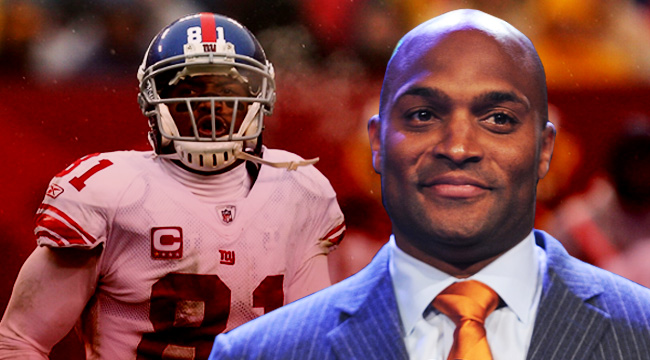
Amani Toomer played 13 seasons in the NFL, all with the New York Giants. He overcame an injury in his rookie season to become a fixture in a franchise that rebuilt itself, found a franchise quarterback, and won a Super Bowl. When Toomer’s career ended in 2008, the former wideout went on a long path to find a physical activity that matched the intensity and focus that football provided. The long fitness road eventually lead to cycling, which he’s enthusiastically persued while continuing his connection to football through the Giants postgame show and on his radio program.
Toomer talked to Uproxx while he was on the bike in his home a few days before joining his family on vacation in Denmark. Listed at 6-foot-3, 205 pounds during his playing days, post-football life was a new world for the former wideout. He said it took a long time to figure out how he wanted to train and what was best for him to get the body he wanted.
The Super Bowl champion talked about his fitness routine after football, why players struggle after they leave the game, and how to repair the relationship between players and the media. We also discussed college football and the coldest game he ever played.
Like a lot of athletes, you have certainly not stopped working out since retirement. What kind of class were you doing this morning?
I do Brazilian Jiu Jitsu now. When I first stopped playing, I didn’t do anything. And I gained, I want to say, like 30 pounds. And then after that, I signed on to run the New York Marathon and I think I was down to 200 pounds. So I went from 240 to 200 and then I was trying to run it for the second year.
But you didn’t run it again, right? It seems like that was working well as far as weight loss. Why did you stop running?
Let’s say my wife wasn’t supportive of me running it for a second year. (Laughs)
So I started just going to the local gym and doing running and lifting by myself. And I thought it was the most boring thing in the world. So then there was a guy there who taught me boxing, so I’d go box with him. And he’d work me out and I’d go boxing, and that was fun for about a year. Then after that, I started doing Orange Theory Fitness workouts because they reminded me of football workouts. They were quick, in and out, high interval training.
And then I got into cycling and cycling has been the best. It’s been something that I can do every day. I don’t have to worry about beating myself up. I don’t have to worry about beating my joints up or my back up or anything like that. I rode the Gran Fondo New York, it’s a 100-mile bike race, in 2015, 2016, and this year. I’ve been riding 10 hours a week.
And then cycling started getting a little… like I started getting repetitive injury stuff and I think my body got used to cycling and I was starting to put on weight again — I was like 220 — so now I’m starting Brazilian Jiu Jitsu and that’s kind of getting the physical aspect of it, the boxing, the football, and stuff that I need.
I need the balance of everything. The cardio, which I love, and the physicality, which is why I do the Brazilian Jiu Jitsu. I got my first strike today, so I was really excited.
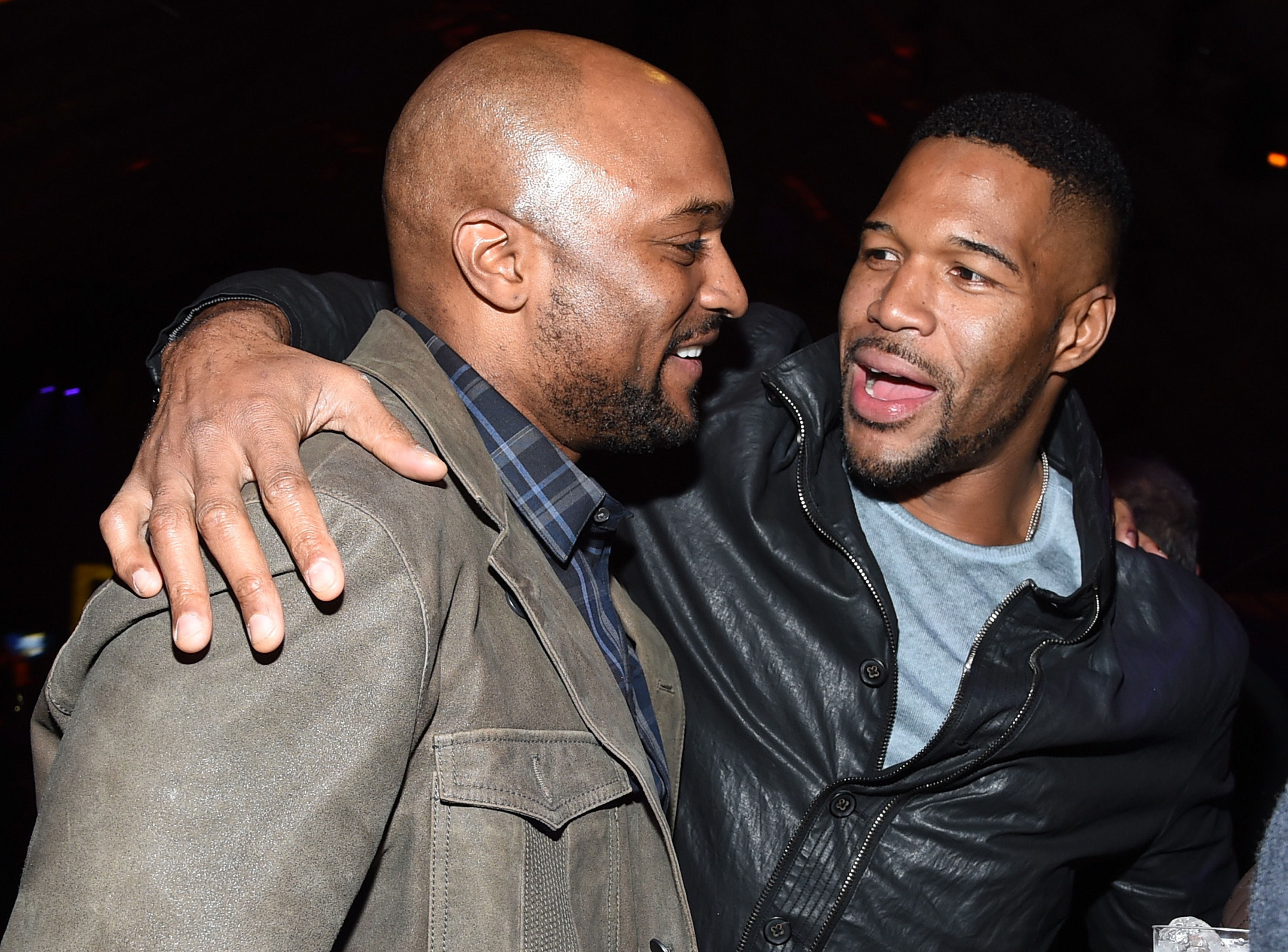
It sounds like after football you were searching around for something to take hold of you. Why do you think you landed on cycling as a way to fill your time and get physical activity?
It’s something you can get better at every day. It’s like a moving meditation. You can go out there by yourself and the only thing you’re focusing on is pushing the wheel and getting up this hill. I like the discipline that it gets you. Because there are no excuses. If you don’t cycle for three days in a row, you’re going to lose fitness.
But you can do it every day. I can ride 100 miles, get off a bike and have a regular day. If I ran a marathon, I’m done for a couple of weeks, a week and a half. I just like that it’s easy on your body. It’s really heart-friendly. You see big results and it gets your heart really strong.
I mean, my legs are stronger now than when I played. I don’t think I can run as fast with them, but I feel like my endurance is really on another level than in my playing career. When I’m doing Brazilian Jiu Jitsu I’m ready to go all the time and some of these guys who just do it — they’re much better than me, I don’t really know what I’m doing — but I’ve got the energy.
What’s a typical day for you on the bike and how many miles do you go? What are you looking to get out of the experience?
I usually only go out if it’s really warm because I’ve been out in the cold too many times in my life because of football. So, I now have the luxury of saying I’m only going to go out when it’s warm out.
I usually go out with a group of people because it’s a lot more fun to talk and stuff. But what I’ll do is I get up in the morning and I get on my bike right away. Most of the time I don’t eat, but I have a bottle of water just to keep me hydrated. I usually ride for like two hours because I like to get 10 hours a week. I like to ride 6 days a week so that I can have the last day of the week.
I’ll ride Monday through Friday and then take off Saturday, then I’ll ride Sunday at night when I put the kids to sleep, usually for about an hour and a half. And my goal is to just get as fit as I possibly can. The fact that I’m getting better every year — it’s a slow process — but it’s a great way to keep my weight down and I think that’s one of the things I like about cycling, too. You put in the work, it’s definitely going to motivate you to eat better because it shows in your cycling. If you eat bad, you can’t expect to cycle any better. So you can’t blame it on anybody but yourself if you don’t reach your goals.
My goal is to be as best as I can. I don’t want to race, I just enjoy it. It’s something I can do every day and get better at. It doesn’t beat me up. I can ride until I’m 70, so I’m excited about that.
Off the bike, what sort of work are you doing to improve your cycling? Do you mostly do leg work? Is it cardio? What’s your gym time like?
I don’t go to the gym. I think the gym and lifting weights, to me, it’s the worst. I can’t focus on that. Because I’m always used to working out with a purpose in mind. And that’s why I do these bike races because I’m like “Hrm, I have this bike race coming up in a couple of months, I better start preparing or I’m going to hurt.”
I’m used to that goal-oriented workout. Working out of the sake of working out just doesn’t do it for me. At all.
Cycling can be an individual sport, but at the same time, there’s a big team aspect to it. You can ride in groups and interact with others. Was that appealing to you as well?
Yeah, I go to the bike gym, Gavia Cycling. We have group rides on Saturday and Sunday and we have training during the week. I have a training program I’m going through there. I’m actually riding a race down in Chile on November 26, after Thanksgiving. I’m going to fly down there and ride in a road race down there.
One of the obstacles for people that would want to get into cycling would be that they don’t know where to start. You can’t just go to a big box store and get the right bike for you. How did you learn what you needed to do to get started? Did you look online? Go to a store?
No, I just went into a bike store. I’ve always liked biking, I used to mountain bike a lot when I was coming off my injury my rookie year. I also used to BMX bike race when I was a kid. Biking was always something that I liked.
I just walked into a bike store and they showed me what I needed to do. They really helped me out in terms of getting me a ride with somebody but that’s why I got involved in this Gavia Cycling. They take people from these SoulCycles and cycle bars and these spin classes.
And spinning is fun, but at the end of the day you’re going to hit your head on it, meaning you’ll get bored of just getting on a bike and indoor biking all the time. You’ll want to get on the road. You’ll want to see those numbers that you’re putting up in the cycle class, how does that relate to the road and Gavia Cycling is the perfect way where you can go inside on a real bike and then they have group rides that can take them out on the road and do road safety.
I think one of the most intimidating things is road safety. People are scared to get on the road and get injured. So that’s why we make sure you keep yourself safe, learn the rules of the road. There are things that bikers do to keep themselves safe and you have to always pay attention and that’s why I think one of the reasons why. My trainer Vito (Valentini) was one of the first guys that took me out when I got my bike and he really made me feel comfortable on the road, and I think that’s kind of what I want to give back to cycling. I really, really enjoy it.
I was looking through your Instagram and saw you’re checking out different bikes in different places. You’re very involved in the community, does that include the Tour de France? Do you keep tabs on it?
Yeah, I’m watching it right now (laughs). I’m on my bike riding and watching the Tour de France. It’s amazing to see what these guys can do. These guys are amazing. They’re riding like 180 miles today. They average like 120 miles a day for 23 days with two rest days.
I saw some photos on Instagram where one of the cyclists just posted a photo of his legs after 19 days of the Tour. Their bodies just look so different. Have you noticed a difference in your body from when you played football to now?
I feel absolutely different. My legs feel really strong. I just feel like my cardio is really good. My body feels strong. I don’t hurt like I used to when I ran a lot.
I think that’s what put me off of running. Because I really enjoyed running, it just beat me up too much. And this is the next best thing. And I don’t have to worry about cartilage. You get a good bike fit and you don’t have to worry about your back or anything because if you have the right gears, you can smoothly pedal and keep yourself going.
The impact that football takes on you throughout your career. A lot of times when guys retire it seems like they just stop altogether because it becomes about preserving your body. Have you told guys “Hey, get on the bike. Let’s go.”?
I have. And the funny thing is a lot of players are like “Wait, you wear those tights?” And I’m like, “yeah. I wear the tights.” And they’re like “I can’t wear the tights.” So I’m like, “Wait a minute, you played for how many years? What were you wearing playing football? They go past your knees so that makes them cool?” I don’t get it.
It’s kind of funny, but yeah they just don’t get the concept of it and I think the imagery of the cyclist is kinda foreign to them, but I enjoy it.
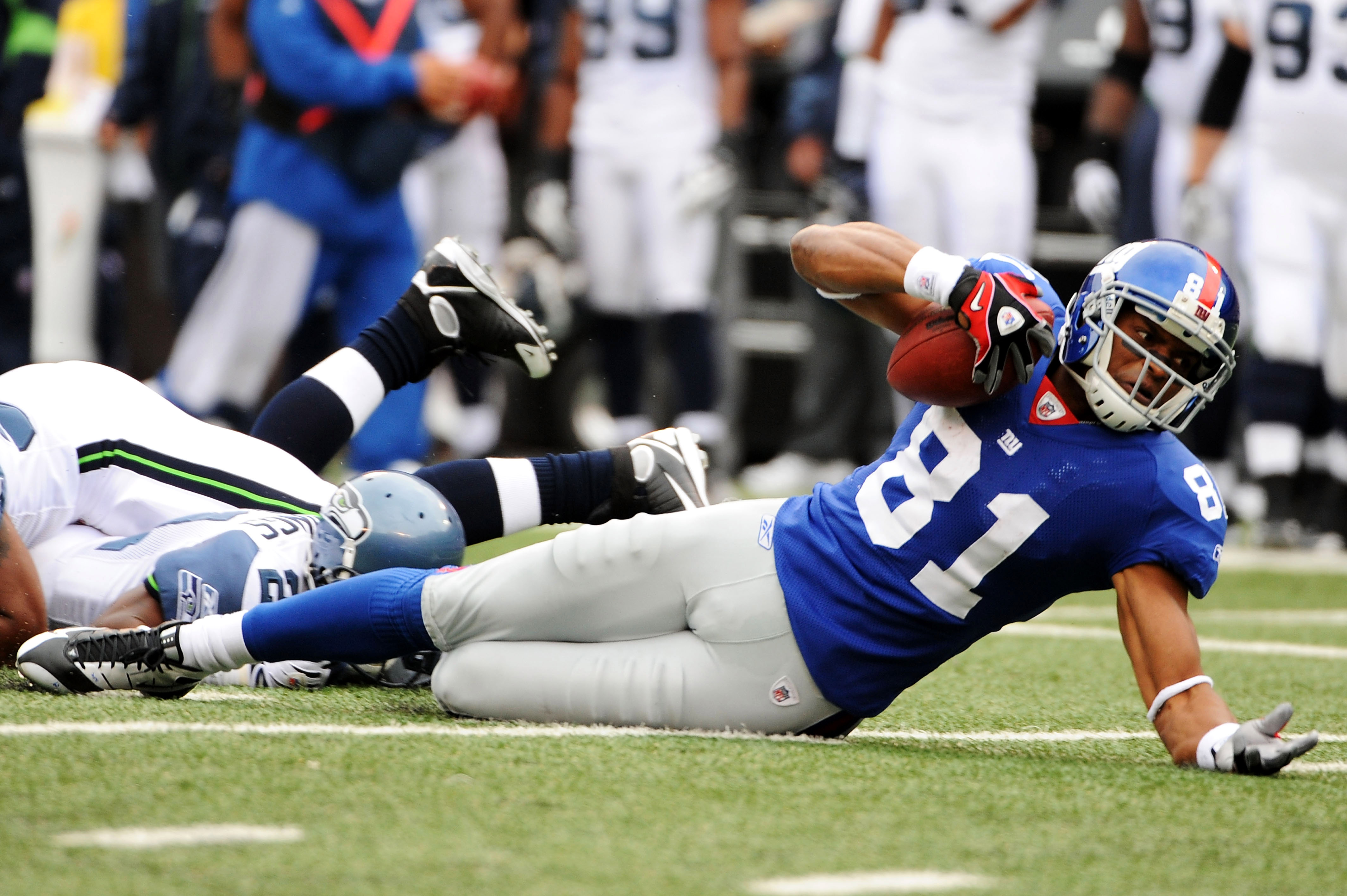
How closely do you watch football these days?
I do the Giants postgame show and I have a radio show on NBC Sports radio, so I’m really involved in sports still. I don’t think I’ll ever stop being involved in sports.
Has your perspective changed on it now that you’re in the media and your voice is heard a lot more often?
Yeah, it has. I think there’s definitely a disconnect between what goes on in the locker room and what goes on in the media. I think there’s a lot of misunderstanding, I think there’s a lot of… agreement. Meaning somebody has an idea and everybody just kind of agrees with that idea. And that’s the message that they put out. And it can be 100 percent false. But if enough people believe it, that’s the truth. And I think that’s kind of a responsibility that the media… Me being in the media, I need to be a little bit more diligent in trying to find what the real story is instead of just trying to regurgitate old stories about what’s going on.
So how does that change? Obviously, media members cannot just walk into the locker room and connect with players on the same level. But is it a demographics thing? Should the media be younger? More diverse? How do you bridge that gap?
I think just the entire relationship between the media and the players… I understand a lot more now why players do not like the media. Because the media has a lot of experience in talking and they know how to change words. They are very good at arguing and making sense. Athletes are good at being athletes. Sometimes the two of them don’t match and you’re going into the media’s world and when you’re trying to explain yourself, a lot of guys don’t have the experience not to open themselves up and get themselves into trouble.
I don’t know what can really save the relationship. I think the trust level between the two, I don’t think it’s ever coming back. Because that’s so much of the game… in the media to break a story and not having any regard for the player. And until that ends, which it’s not because that’s the goal of the media, it’s a tough, very contentious situation. I don’t know how it’s going to change.
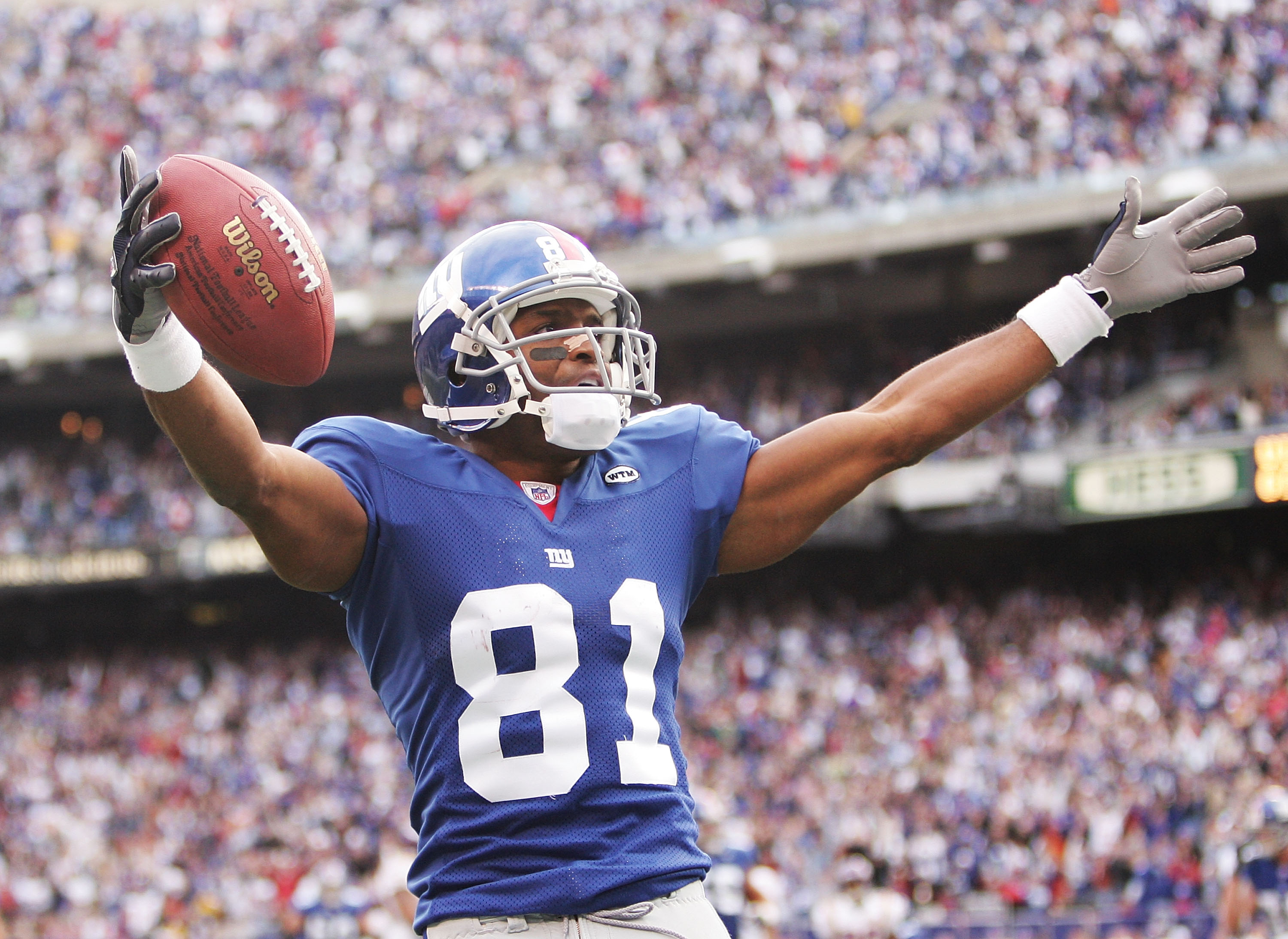
How much does winning change that relationship? You were on a Giants team that went to the Super Bowl in 2000 and won it against the Patriots in 2007. Did the tenor of that locker room and its relationship with the media change?
I think that winning is something that — it takes a lot to win. For people to bang on one or two players because a team isn’t winning, it’s tough. There’s a lot of moving parts, so for people to change their opinion on a player because they win, I just don’t know how right that is. There are a lot of really good players that are just in bad situations that are never going to win just because of the situation they’re in.
Philip Rivers comes to mind. He’s a great quarterback. He’s never been in a situation where the team was secure, the ownership situation was secure, the team that he’s on was secure. There are always things moving around in places that make it hard for not only him as a quarterback on offense but team moral as a whole.
There’s a guy like Tom Brady who has had everything. Everything has been set up perfectly for him. I don’t know how much better a quarterback situation can be. Comes in with no expectations. Learns from the situation. Then gets an opportunity to play, performs well. Has a defense that really shelters him for a couple years.
I’m not trying to take anything away from Tom Brady, I just realize that he’s been very, very lucky and he’s a guy I consider a friend. He’s done a great job with his opportunity. But his security and his stability need to be factored into how great he is as opposed to other quarterbacks not in that situation.
You’re a Michigan guy just like Brady. College football is a few days away. What do you expect from the Wolverines this season?
I don’t know. They lost a lot of people. If they get a good recruiting class, maybe. But we’re going to see how good a coach Jim Harbaugh is because there are a lot of new faces out there getting ready to play that we haven’t seen yet. So until we see it, I’m always cautious.
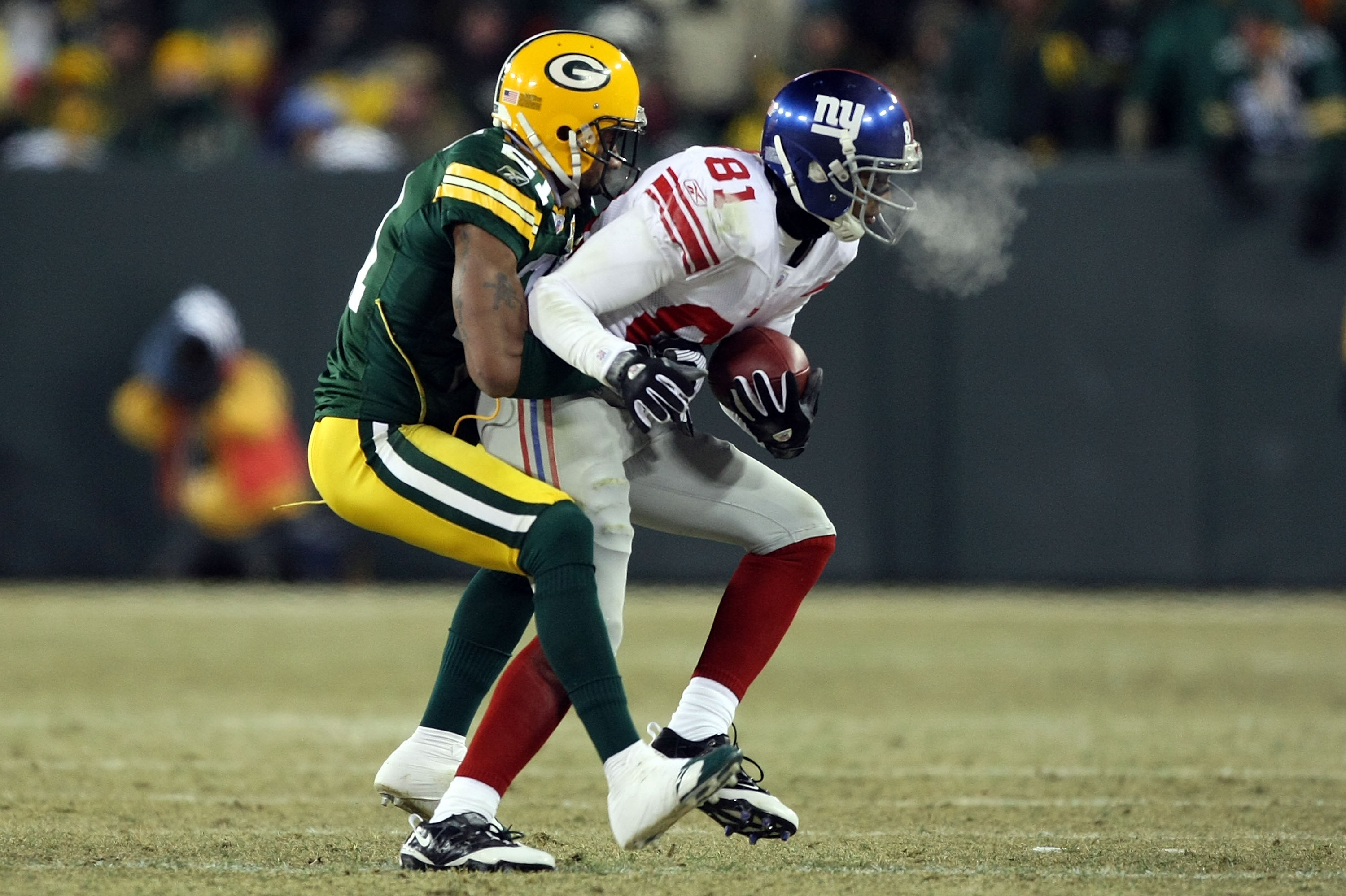
You mentioned cold weather games I wanted to ask you what the coldest you’ve ever been in your career.
We played in Buffalo in 2007 and it rained and then it froze and then it started snowing and the rain… it was ridiculously cold. It was actually colder than I think the Green Bay game we played in in 2007.
There were icicles coming off our necks in warmups. But the thing about Green Bay is it was dry and there was no wind. It was unbearable, but if it was wet like the game in Buffalo was that year, it would have been the worst. It would have been ridiculously bad.
But because it was dry, and it wasn’t really windy, the coldest game I played in was that game in Buffalo.
I actually was at that game! I’m from Buffalo and it was absolutely the coldest game I’ve ever been to. But that game sort of pushed you guys to the Super Bowl. You played the Patriots the next week and then saw them again a month later.
That was the game that guaranteed us a playoff spot. That game was ridiculously cold. It felt colder because we were wet, but the game in Green Bay, everybody was coughing on the flight back because our lungs were burned. And coach Coughlin’s face was burned. That was a cold day.






